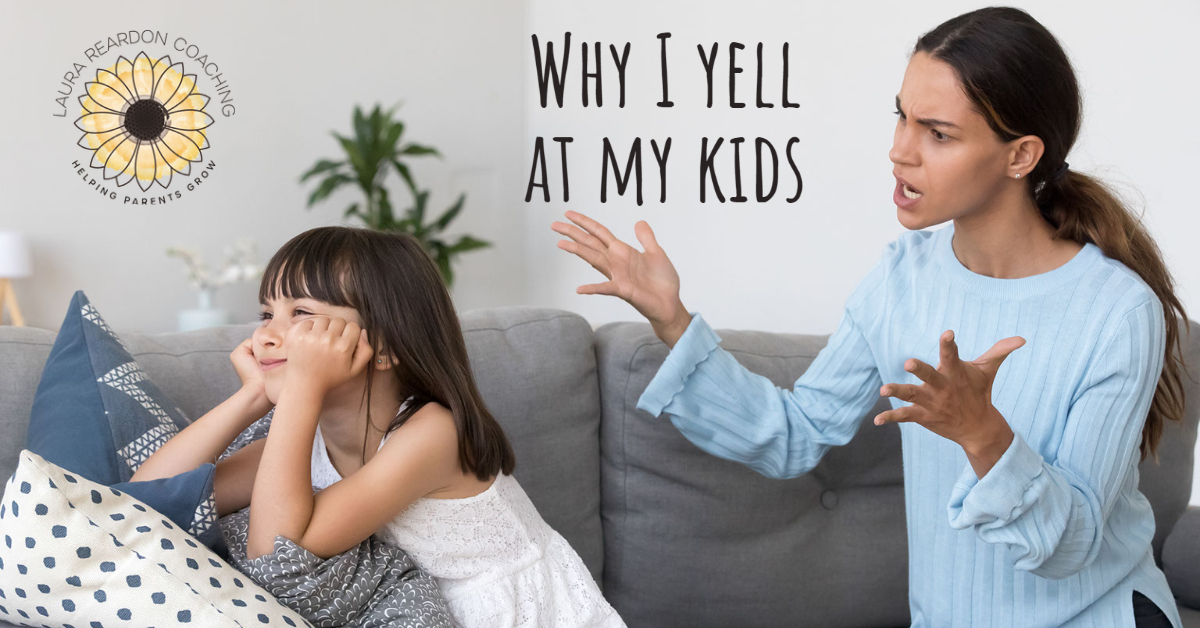
Why I Yell at My Kids
Confessions from a Parent Coach
We gave our kid the purple cup instead of the pink cup, their socks feel too tight, they want the toy the other kid has, they want our attention when we’re feeding the baby, they asked for something and we said no, it’s time to transition from one activity to another, they’re overstimulated, hungry, or tired…and the next thing we know they’re melting down and misbehaving.
And the next thing we know…we’re yelling.
Or for those of us with older kids…it’s time for them to get ready for school, turn off their video game, empty the dishwasher, or do their homework, or they’re fighting with their sibling and we told them to stop, we’ve set a limit but they’re not taking no for an answer, they’re stressed, hungry, or tired…and the next thing we know they’re disrespectful and defiant.
And the next thing we know…we’re yelling.
And the yelling turns into an endless argument that solves nothing.
We’ve all been there.
It makes SO much sense that we yell at our kid and here’s why:
For our ancestor’s threats were constant but 2 instincts helped them survive:
- Negativity Bias: they made quick judgments that assumed the worst. For example, they may have seen a stick and assumed it was a snake or a beige rock in the distance and assumed it was a saber-tooth tiger. Their negativity bias could make the difference between life and death.
- Fight, flight, or freeze response: Their nervous system was a 2-way system of communication between their brain and their body that controlled everything they did. When their nervous system perceived safety they were regulated; calm, flexible, and open to listening, learning, and problem solving. But when their nervous system perceived a threat it unconsciously activated their fight, flight, or freeze response. This rapid response caused physiological changes to their body to prepare them to fight, run away, or freeze to protect themselves from danger. They moved to a dysregulated state; they were defensive and inflexible.
And our brains evolved to do the same.
But in today’s world we experience fewer physical threats than our ancestors and so more often our negativity bias and fight, flight, or freeze response get activated during non-life-threatening experiences. For example:
- Our kid is melting down or misbehaving…or being disrespectful and defiant…and our negativity bias kicks in. We make quick judgments that assume the worst. We think they are purposefully provoking us. We think they should know better or do better. We worry they’re mean, spoiled, or selfish. We wonder if there is something wrong with them…or something wrong with us. And these thoughts trigger big emotions in us like anger, worry, hurt, embarrassment, or hopelessness.
- When we experience strong feelings such as anger, worry, hurt, embarrassment, or hopelessness…or when our core needs for things such as sleep, food, hydration, movement, connection, downtime, and autonomy are unmet as is often the case with busy parents…these big feelings and unmet needs are not actually dangerous…but our nervous system perceives them as a threat which activates our fight, flight, or freeze response to prepare our body to defend ourselves. For some of us, we go into fight mode and lash out – we yell, blame, shame, threaten, lecture, nag, bribe, or punish. For some of us we go into flight mode – we become physically unavailable to our kid. Or for some we freeze – we become emotionally unavailable.
It makes SO much sense that we lash out or shut down in reaction to our kid’s big emotions and challenging behaviors.…and we ALL do it sometimes.
And yet…we want to understand that when we respond in defensive ways it only serves the purpose of escalating the storm.
We want to get better at managing our emotions and behavior…and we want to help our kid learn to manage their emotions and behaviors…but feel frustrated, worried, and unsure how to do it.
Counting to three, time-outs, rewards, consequences, or ignoring unwanted behaviors were considered state of the art tools over 20 years ago… but looking at behavior through the lens of neuroscience – the study of how our nervous systems unconsciously affects our behavior – is creating a paradigm shift in parenting and now we have more informed and more effective ways to respond to emotions and behavior…ours and our kid’s.
Books, podcasts, and classes can be great resources for learning these new ways. But I specialize in helping parents create Personalized Parenting Plans…because learning how to take what you’re learning and apply it to the specific parenting challenge you are struggling with is what turns learning into action that creates positive change.
Let’s create a Personalized Parenting Plan…and more peace in your family.




